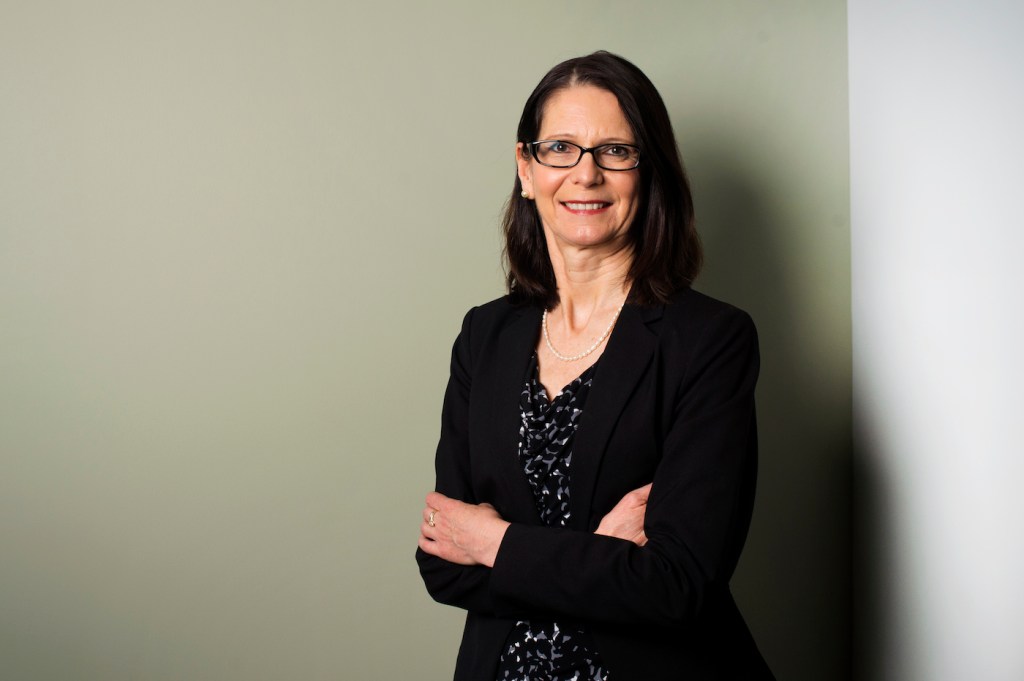This Northeastern dean knows the secret to success. And it takes more than algorithms and equations

Years ago, when her children were young, Nadine Aubry and her husband bought a minivan. The whole family was excited, said Aubry, dean of Northeastern’s College of Engineering. But while her husband found the car a pleasure to drive, Aubry did not. She never liked the driver’s seat.
“My back was always hurting as soon as I would sit in the van—probably because it had been designed by a man and was made to fit comfortably a man’s back,” Aubry said. She thought, had a woman contributed to the seat’s design, perhaps it would have been made more flexible and adjustable.
The anecdote shows, she said, how women have plenty to contribute to a field notoriously dominated by men. Engineering needs women not only because they have the skills and ability and bring a different perspective but also because they are more than half the consumer base.
“You need to have a diversity of people coming up with the next wave of technologies, because you set up better problems and end up with better solutions from the various perspectives, but also because your users are going to be diverse themselves,” Aubry said. This notion has been a guiding theme in her overall strategy and vision leading the College of Engineering.
How does the College of Engineering at Northeastern prepare students to succeed in a world where technology is constantly evolving?
We live in a technological world, engineers have a big role to play. It’s actually prime time for engineering. But the engineers who are going to be successful will have to be multifaceted. They need strong technical knowledge and competencies, but they also need to have strong communication skills, the ability to work in teams, and an entrepreneurial, business, and global mindset. We must make sure they understand the big picture—how engineering can influence the world and help society, solve big problems, and give people a better life in this country and in the world. Engineers need to take into account both the technical and non-technical aspects early in the problem setting and throughout the design process. This approach is crucial to ensure engineers develop transformative solutions and add value for the people.
We are emphasizing tremendously to our students the importance of being multifaceted and interdisciplinary, taking courses in other colleges, considering a minor outside their area of study, or combining majors. We have worked hard on creating a multitude of cross-cutting programs available to engineering students not only at the boundary between the various engineering disciplines but also with all the other colleges, including the non-STEM ones.
I believe in teaching the next generation of engineers how to innovate. The fundamentals of engineering are still crucial, but it’s also critical for our students to learn what to do with that knowledge and how to solve a problem and satisfy a need that people have. You have to be both multifaceted and interdisciplinary to be able to do this. In addition, our students learn a great deal of the innovative process throughout their journey at Northeastern, starting with our new series of two introduction to engineering courses with a hands-on cornerstone project; continuing through many experiences in and outside the classroom, including our 50-plus competition-winning student clubs, co-op experiences, our Michael and Ann Sherman Center for Entrepreneurship Education; and culminating with significant capstone projects.
How has the college worked in recent years to stay ahead of the curve?
In addition to all these novel educational approaches and programs, the vision and strategy has been to support and mentor our existing faculty the best we can while also hiring outstanding faculty. I am very proud of our faculty; they are all excited about our educational and research models here at Northeastern. They all work very hard to continue the long tradition of teaching our undergraduate students, but also to be at the forefront of their fields and teach our large and still growing population of graduate students. I’m very proud of their discoveries, their agility to conduct research across the traditional disciplines, and their ability to work on the next generation of engineering devices and methods. And faculty love coming here. They love our model of education, but they also love being at the cutting-edge of research and our collegiality and approach to interdisciplinary collaborations, and they love this push we have to solve big challenges in the world.
Faculty also know this is a superior university because they learn about new technological needs and advances by having the students come back to the classroom from co-ops in industry and raise their hands and say, ‘Have you thought about this? Because I spent the past six months working on this timely issue or nascent technology, or using new software or hardware.’
What are some of the options available to students who want an interdisciplinary engineering education?
There are many that we have created in recent years to better serve our students. I have a file where I keep track of all of them and they no longer fit on one page! For example, we have a Master of Science in engineering and public policy with the College of Social Sciences and Humanities. We have another Master of Science in sustainable building systems with the College of Arts, Media and Design, between civil and environmental engineering and architecture. We created a three plus three program between engineering and the law school, meaning that students earn an undergraduate engineering degree in three years and then a juris doctorate in three additional years. It’s very unique. We also have an engineering business program in which our students earn an undergraduate degree in any of our engineering disciplines, a Master of Science in engineering management or civil engineering with a concentration in project management, a graduate certificate in engineering business, and a Master of Business Administration. We also recently designed a combined degree between electrical engineering and music. And the list goes on. Our students have endless possibilities.





